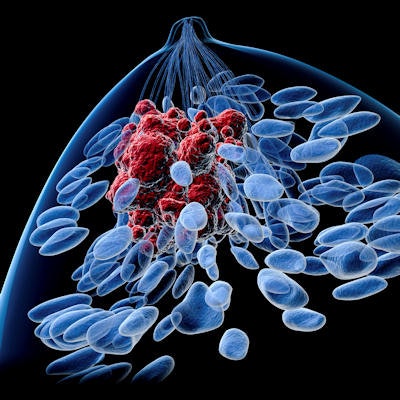
Multigene testing of all women with breast cancer is "extremely cost-effective," according to a large study of data from the U.S. and U.K. published online in JAMA Oncology on October 3. But though the case is building for more testing, the debate is far from over.
Currently, most guidelines advise genetic testing only for patients who meet certain criteria: for example, if someone in their family has tested positive for BRCA1/2 mutations, which cause the most concern in breast cancer as well as ovarian cancer. There are also issues associated with expanding testing, including costs.
The researchers modeled costs associated with testing for BRCA1, BRCA2, and PALB2 for 11,386 women with breast cancer, regardless of family history. They concluded that expenses would be well below cost-effectiveness thresholds, based on standard analyses of incremental cost-effectiveness ratios (ICERs) per quality-adjusted life years (QALYs).
The data are strong enough to call for a policy change, wrote senior author Dr. Ranjit Manchanda, PhD, a gynecological oncologist and clinical senior lecturer at Queen Mary University of London, and colleagues.
"This study's findings suggest that unselected multigene testing for [breast cancer] susceptibility genes BRCA1/BRCA2/PALB2 can substantially reduce future [breast and ovarian cancer] cases and related deaths compared with the current clinical strategy," Manchanda et al wrote. "Our analysis suggests that an unselected testing strategy is extremely cost-effective for [U.K.] and [U.S.] health systems and provides a basis for change in current guidelines and policy to implement this strategy."
Case for more testing
Decisions about who should get genetic testing for breast cancer have been controversial and tackled in a number of trials, including a small study of patients in the U.K. that supported broader, simpler screening guidelines. The U.S. Preventive Services Task Force (USPSTF) called for more testing of women with breast cancer for BRCA1/2 mutations in new guidelines released in August. According to the USPSTF, women with a personal history of breast cancer should get tested, but the National Comprehensive Cancer Network guidelines do not have such a broad recommendation.
The authors of the study just reported in JAMA Oncology noted that current national and international guidelines recommend testing in women with breast cancer who have recognized or established family history or clinical criteria. But patients with pathogenic variants do not always have a positive family history, and testing is underused, they added.
"Limited awareness by [healthcare] professionals and the public, complexity of the current structure, restricted genetic counseling services, and current testing pathways have fostered restricted access and massive underuse of genetic testing services," Manchanda and colleagues wrote. "Only 20% to 30% of eligible patients are referred and access testing, and 97% of estimated carriers in the population remain unidentified, missing substantial opportunities for precision prevention."
The researchers sought to estimate benefits and costs and to evaluate the cost-effectiveness of genetic screening in the U.S. and the U.K. Data were drawn from women enrolled in two large breast cancer studies in the U.K. and also from the Kaiser Permanente Washington Breast Cancer Surveillance Registry.
Manchanda et al acknowledged that there are a range of hereditary genes associated with breast cancer, but the evaluation was limited to BRCA1, BRCA2, and PALB2 based on prevalence, risk level, and the potential for interventions.
Two strategies were evaluated:
- All women with breast cancer had BRCA1/BRCA2/PALB2 testing.
- Only women with breast cancer fulfilling family history or clinical criteria had BRCA testing.
Costs well within health system thresholds
Modeling allowed for mutation-positive women to have contralateral preventive mastectomy and risk-reducing salpingo-oophorectomy, as well as for relatives of carriers to undergo their own screening. Then, the researchers estimated the number of diagnoses, death rates, and other outcomes, and they assessed cost-effectiveness QALYs from the perspective of payors and society.
They found that moving toward a broader system of testing would prevent cases of breast and ovarian cancer, as well as deaths. Furthermore, resources could be saved, as the ICERs were well below the established cost-effectiveness thresholds for health systems in the U.S. ($100,000/QALY) and the U.K. (20,000 pounds/QALY). Changing policy would require preparation for increased lab testing to manage sample throughput and avoid bottlenecks, they acknowledged.
| Cost-effectiveness estimates for 1 year of unselected BRCA1/BRCA2/PALB2 testing | ||||
| Population | No. of breast, ovarian cancers prevented | No. of deaths prevented | QALY: Payors | QALY: Society |
| U.S. | 2,101 | 2,406 | $65,661/QALY | $61,618/QALY |
| U.K. | 9,733 | 633 | 10,464 pounds/QALY | 7,216 pounds/QALY |
Opening Pandora's box?
An accompanying editorial for the cost-effectiveness study, also published in JAMA Oncology on October 3, sounded a cautionary note, however, about broadening the use of genetic testing in breast cancer patients.
The editorial authors acknowledged the strong evidence for knowing BRCA mutation status at the time of diagnosis in terms of guiding treatment strategy and preventing relapse, as well as determining eligibility for targeted drugs, notably poly (ADP-ribose) polymerase inhibitors.
"Existing guidelines for genetic testing, such as those from the National Comprehensive Cancer Network, are effective at identifying women with pathogenic variants in BRCA1/2," wrote Dr. Mark Robson, chief of breast medicine at Memorial Sloan Kettering Cancer Center, and Dr. Susan Domchek, a professor of oncology at the University of Pennsylvania.
They cited a study showing that pathogenic BRCA1/2 variants were found in only three of 480 patients who did not meet guidelines for testing.
"The degree to which testing criteria would have to be relaxed to identify this small proportion of patients is not discernible in this article," Robson and Domchek wrote.
They also noted that testing is now being done through panels assessing the presence of many types of mutations. This creates a risk that more pathogenic variants with uncertain significance will be found, they warned.



















